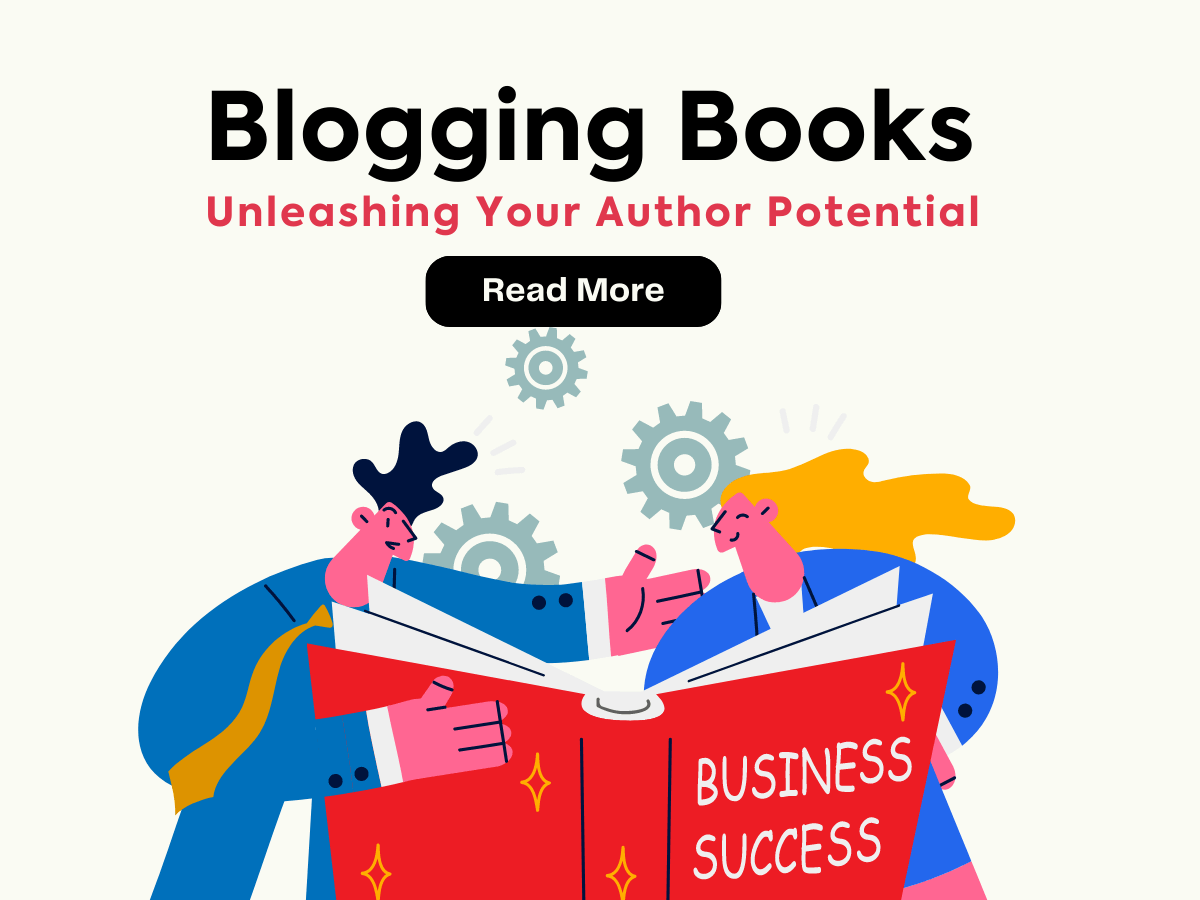Have you ever considered combining your passion for blogging with the art of writing a book? Blogging books, a rapidly growing trend in the publishing industry, offer a unique avenue for bloggers to expand their reach, establish authority, and even generate passive income. In this comprehensive guide, we will explore the benefits of blogging books, the process of creating and publishing one, and strategies to maximize its impact. So, whether you're a seasoned blogger or just starting out, join us on this exciting journey as we unleash your author potential.
Table of Contents
I. Introduction
A. Definition of Blogging Books
Blogging books are a fusion of traditional book writing and blogging. They are written by bloggers who leverage their expertise and existing blog content to create a cohesive, informative, and engaging book. These books often provide deeper insights, expanded knowledge, and a structured format that appeals to a broader audience.
B. Importance of Blogging Books
Blogging books have gained significant popularity due to the numerous benefits they offer. They enable bloggers to showcase their writing skills, build an author platform, generate passive income, and establish authority and credibility in their niche. Furthermore, blogging books can serve as a valuable resource for readers who prefer a more in-depth exploration of a particular topic.
II. Benefits of Blogging Books
A. Enhancing Writing Skills
Writing a blogging book allows bloggers to refine their writing skills. It presents an opportunity to delve into extensive research, experiment with different writing styles, and develop a more structured and polished writing approach. By going through the process of writing a book, bloggers can elevate their writing abilities and produce higher quality content.
B. Building an Author Platform
A blogging book serves as a powerful tool to build and expand an author platform. By establishing themselves as published authors, bloggers can gain credibility and attract a larger audience. The book acts as a tangible representation of their expertise and authority, opening doors to speaking engagements, collaborations, and other opportunities within their niche.
C. Generating Passive Income
One of the key advantages of blogging books is the potential to generate passive income. By monetizing their books, bloggers can earn royalties from book sales, creating a consistent stream of revenue. Additionally, bloggers can leverage their book's content to develop supplementary products or services, such as online courses or consulting, further enhancing their income potential.
D. Establishing Authority and Credibility
Writing and publishing a blogging book allows bloggers to establish themselves as thought leaders and experts in their field. The book provides a platform to share unique insights, experiences, and knowledge, positioning the author as a credible source of information. This enhanced authority opens doors to new collaborations, partnerships, and speaking opportunities.
III. Choosing a Blogging Book Topic
A. Identifying Your Target Audience
Before embarking on the journey of writing a blogging book, it is crucial to identify your target audience and understand their needs, interests, and pain points. Understanding your audience will help you tailor your book's content to resonate with them, ensuring its relevance and appeal.
B. Selecting a Niche
To stand out in the crowded publishing market, it's essential to choose a specific niche for your blogging book. Narrowing down your focus allows you to cater to a specific audience with specialized knowledge and insights. This targeted approach increases the chances of attracting a dedicated readership and establishing yourself as an authority in that niche.
C. Conducting Market Research
Conducting thorough market research is a vital step in selecting a blogging book topic. Analyze existing books in your niche to identify gaps and areas that can be expanded upon. This research will help you determine the unique selling points of your book and ensure that it offers valuable and original content that sets it apart from competitors.
IV. Planning and Outlining Your Blogging Book
A. Defining the Book's Purpose and Goals
Before diving into writing your blogging book, it's essential to define its purpose and goals. Ask yourself what you want to achieve with your book. Are you aiming to educate, entertain, inspire, or provide practical guidance? Clarifying your book's purpose will guide your writing process and ensure that it delivers value to your readers.
B. Creating an Outline and Chapter Structure
An organized and well-structured blogging book is crucial for a smooth writing process. Start by creating an outline that outlines the main topics and subtopics you'll cover in each chapter. This outline serves as a roadmap, helping you maintain a logical flow throughout the book. Each chapter should have a clear focus, and the topics should build upon one another, creating a cohesive reading experience.
C. Conducting Thorough Research
To provide accurate and valuable information in your blogging book, thorough research is essential. Dive into reliable sources, gather data, statistics, case studies, and examples that support your ideas. Incorporate personal experiences, anecdotes, and insights to make your book engaging and relatable. Remember to properly cite your sources and give credit where it's due to maintain credibility and integrity.
V. Writing and Editing Your Blogging Book
A. Developing Engaging Content
When writing your blogging book, aim to engage your readers from start to finish. Write in a conversational tone, as if you're having a conversation with your audience. Use personal pronouns to create a connection and make your writing relatable. Incorporate storytelling techniques, anecdotes, and real-life examples to captivate your readers and keep them invested in your book.
B. Incorporating Personal Stories and Anecdotes
Personal stories and anecdotes add a human touch to your blogging book. Share your own experiences, challenges, and triumphs to connect with your readers on a deeper level. This personal touch not only makes your book more engaging but also reinforces your credibility as an author who has lived through the concepts and lessons you're sharing.
C. Ensuring Proper Grammar and Spelling
To maintain professionalism and ensure clarity, it's crucial to pay attention to grammar and spelling throughout your blogging book. Proofread your content carefully, checking for any grammatical errors, typos, or inconsistencies. Consider using grammar and spelling tools or hiring a professional editor to ensure the highest level of accuracy and readability.
VI. Designing a Professional Book Cover
A. Importance of a Captivating Book Cover
A captivating book cover plays a significant role in attracting potential readers and conveying the essence of your blogging book. It serves as the first impression and represents the quality and professionalism of your content. Invest in a professionally designed book cover that aligns with your book's topic, genre, and target audience.
B. Hiring a Graphic Designer or Using Online Tools
To create a visually appealing book cover, you have the option to hire a professional graphic designer or utilize online design tools. A graphic designer can bring your vision to life and create a unique, eye-catching cover. Alternatively, online tools like Canva provide user-friendly templates and customization options, allowing you to design a professional-looking cover even without design experience.
VII. Publishing and Promoting Your Blogging Book
A. Choosing the Right Publishing Platform
Selecting the appropriate publishing platform is crucial for the success of your blogging book. Consider both traditional publishing and self-publishing options. Traditional publishing involves submitting your manuscript to publishing houses, which handle the editing, design, printing, and distribution. Self-publishing empowers you with more control and higher royalties, but you'll need to manage the publishing process independently.
B. Leveraging Social Media and Email Marketing
To effectively promote your blogging book, utilize the power of social media and email marketing. Build an online presence on platforms relevant to your target audience, such as Facebook, Instagram, Twitter, or LinkedIn. Share teasers, excerpts, and behind-the-scenes content to create anticipation. Additionally, build an email list and send regular updates, exclusive offers, and valuable content to engage with your readers and potential buyers.
C. Seeking Reviews and Testimonials
Positive reviews and testimonials can significantly impact the success of your blogging book. Encourage readers to leave reviews on platforms like Amazon, Goodreads, or personal blogs. Offer complimentary copies to influencers, bloggers, or experts in your field, requesting their honest feedback and testimonials. These endorsements will boost your book's credibility and attract more readers.
VIII. Generating Income from Your Blogging Book
A. Pricing Strategies
Choosing the right pricing strategy for your blogging book is crucial to maximize both sales and revenue. Consider factors such as your target audience's purchasing power, the perceived value of your content, and the pricing trends in your niche. Experiment with different price points, discounts, and promotional offers to find the optimal balance between profitability and attracting buyers.
B. Leveraging Affiliate Marketing
Affiliate marketing is an effective strategy to generate additional income from your blogging book. Partner with relevant affiliate programs or influencers in your niche who can promote your book to their audience. Offer them a commission for each sale they generate. This collaboration benefits both parties, as you expand your reach while the affiliate earns a commission from successful referrals.
C. Creating Additional Products or Services
Your blogging book can serve as a springboard for creating additional products or services. Consider developing online courses, workshops, coaching programs, or consulting services that expand on the concepts covered in your book. These offerings provide value to your audience and create new income streams, leveraging your expertise and credibility.
IX. Interacting with Your Readers
A. Encouraging Feedback and Reviews
Actively engage with your readers by encouraging feedback and reviews. Create avenues for readers to share their thoughts, questions, and experiences related to your book. Respond to comments, address concerns, and express gratitude for their support. This interaction not only strengthens your relationship with readers but also provides valuable insights for future content improvements.
B. Building a Community Around Your Book
Foster a sense of community among your readers by creating platforms where they can connect and engage with one another. This can be a dedicated Facebook group, an online forum, or a book club. Encourage discussions, share additional resources, and host exclusive events for community members. A thriving community creates a loyal readership base and generates word-of-mouth promotion for your book.
C. Engaging with Readers through Social Media
Maintain an active presence on social media to stay connected with your readers. Regularly share valuable content, insights, and updates related to your book. Respond to comments, messages, and direct inquiries promptly and genuinely. By being accessible and engaging on social media, you cultivate a loyal following and establish yourself as an approachable author.
X. Conclusion
Writing a blogging book offers a unique opportunity for bloggers to expand their reach, establish authority, and generate income. By combining their expertise and blog content in a cohesive book, bloggers can provide valuable insights, engage readers, and build a loyal audience. So, unleash your author potential, follow the steps outlined in this guide, and start your journey towards creating a successful blogging book.
FAQs
Can I write a blogging book if I'm a new blogger?
Absolutely! Writing a blogging book can be a rewarding experience, regardless of your experience level. Just ensure that you have a solid grasp of your chosen topic and conduct thorough research to provide valuable insights to your readers.
How long does it take to write and publish a blogging book?
The time required to write and publish a blogging book can vary depending on factors like the book's length, complexity, and your writing pace. On average, it may take several months to a year from start to publication.
Do I need to have a large following to publish a successful blogging book?
While having a large following can certainly help with book promotion, it's not a prerequisite for publishing a successful blogging book. Focus on creating quality content, targeting the right audience, and leveraging marketing strategies to reach and engage your readers.
Can I self-publish my blogging book?
Yes, self-publishing is a viable option for bloggers who want more control over the publishing process. Platforms like Amazon Kindle Direct Publishing (KDP) and Smashwords allow you to self-publish your book in digital and print formats.
How do I know if my blogging book is successful?
The success of a blogging book can be measured in various ways, including book sales, positive reviews and testimonials, increased visibility and authority in your niche, and the impact it has on your readers. Define your own success metrics and continuously assess your progress against them.
People also ask
Do book bloggers get paid?
Book bloggers have the potential to earn income through various means. While not all book bloggers are paid, some do receive compensation for their work. They can monetize their blogs through advertising, sponsored content, affiliate marketing, or by partnering with publishers and authors for book reviews or promotional campaigns. The level of payment varies depending on factors such as the blogger's reach, influence, and the nature of the collaboration.
What is book blogging?
Book blogging is a form of content creation where individuals share their thoughts, reviews, recommendations, and discussions about books on a dedicated blog. Book bloggers often have a passion for reading and enjoy sharing their literary experiences with their audience. They write detailed reviews, engage in book-related discussions, and provide valuable insights to help readers discover new books or make informed choices about their reading selections.
What is the number 1 blogging?
Determining the number one blogging depends on various factors and can be subjective. However, several blogs have gained significant recognition and popularity. Some prominent blogs cover diverse topics like lifestyle, technology, fashion, travel, or personal development. The “number one” status can be attributed to factors such as high readership, engagement, influence, and the ability to consistently deliver valuable content that resonates with a wide audience.
Which blog pays you?
Several blogs offer opportunities for writers to get paid for their contributions. Some popular platforms that pay writers include Medium, HuffPost, Forbes, and Entrepreneur. These blogs typically have contributor programs or accept guest posts, allowing writers to share their expertise and receive compensation in return. Additionally, niche-specific blogs, magazines, or online publications often offer payment to writers who provide quality content in their respective areas of interest.
Who gets paid to read books?
While the act of reading books itself may not typically be a paid activity, there are professions and opportunities where individuals can get paid to read books. Some examples include:
- Book Reviewers: Professional book reviewers often receive advance copies of books and are paid to read and provide detailed reviews for publishers, literary magazines, or media outlets.
- Literary Critics: Critics who specialize in analyzing and evaluating literature can be employed by newspapers, magazines, or academic institutions to read and critique books.
- Editors: Book editors work closely with authors, reading manuscripts, and providing feedback to improve the quality and marketability of the books. They are typically employed by publishing houses or work as freelancers.
- Literary Agents: Literary agents represent authors and help them secure book deals with publishers. They read manuscripts, provide feedback, and negotiate contracts on behalf of the authors. Agents earn a commission from the book sales.
- Librarians: While not directly paid for reading books, librarians have the opportunity to read and evaluate books to curate collections for their libraries and make recommendations to readers.
It's important to note that these roles often involve additional responsibilities beyond just reading, and compensation may vary based on factors such as experience, expertise, and the specific nature of the position.




